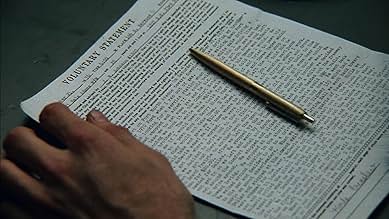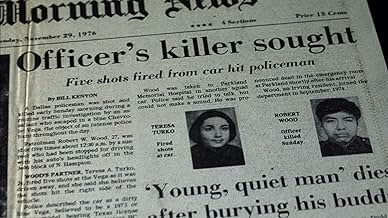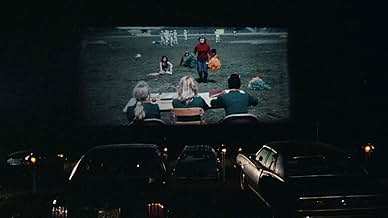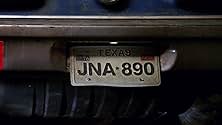IMDb RATING
7.9/10
27K
YOUR RATING
A film that successfully argued that a man was wrongly convicted for murder by a corrupt justice system in Dallas County, Texas.A film that successfully argued that a man was wrongly convicted for murder by a corrupt justice system in Dallas County, Texas.A film that successfully argued that a man was wrongly convicted for murder by a corrupt justice system in Dallas County, Texas.
- Awards
- 12 wins & 5 nominations total
- Director
- Writer
- All cast & crew
- Production, box office & more at IMDbPro
Featured reviews
Randall Adams was a drifter who was picked up by runaway teenager David Harris when he ran out of petrol. The two men hang out for a while, drank some beer, went to the movies, smoked some weed. At this point Adams says he went his own way to his motel with his brother, watched TV and went to sleep. Alternatively, Harris says the two men stayed together were stopped by the police when Adams took out a gun and opened fire on a police officer before driving off. This film follows the court case which charged Adams for the murder of a police officer, with the underage Harris (who was ineligible for the death penalty) as one of the main witnesses against him.
I do enjoy a Perry Mason film because, after a solid hour of red herrings and question-marks, it always come down to the big reveal with Mason demanding "isn't it true? ISN'T IT?" as everyone gasps, the guilty confesses on the stand and justice is done. Sadly this is not a documentary but a basic TVM series and what the Thin Blue Line does so effectively is to get passed all our ideas of how justice works from films and presents a near-unquestionable miscarriage of justice. At no point does the "guilty" person get totally exposed (although the suggestion is very clearly there as to who it was) but instead Morris goes after the idea of reasonable doubt (which, if there is any, then the charged should not have been convicted). Starting at the very start of the fateful evening, Morris uses interviews and some reconstructions to tell the story of what happened from various points of view initially with a focus very much on the events as the courts saw it.
From here he then uses these same contributions to inject a huge amount of doubt into the vast majority of the case for the prosecution. If you want to find it, there are things in here that could be taken as anti-death penalty but for me the film is pro-justice as opposed to anti-anything as it is essentially reinforcing the importance of reasonable doubt. By virtue of doing this, everyone involved looks bad and Morris wisely doesn't need to pick on anybody in particular directly. It is fascinating as a film but I can understand the occasional claim of it being "dull" I cannot agree with it but I can understand because, in a world where excess is the norm (style, action, violence, opinion) anything that is actually restrained and even handed could be taken as "dull".
This modern moaning aside though, The Thin Blue Line is a well made film that simply and matter-of-factly condemns the justice system as it applied to Randall Adams. One of Morris' best films and worth seeking out.
I do enjoy a Perry Mason film because, after a solid hour of red herrings and question-marks, it always come down to the big reveal with Mason demanding "isn't it true? ISN'T IT?" as everyone gasps, the guilty confesses on the stand and justice is done. Sadly this is not a documentary but a basic TVM series and what the Thin Blue Line does so effectively is to get passed all our ideas of how justice works from films and presents a near-unquestionable miscarriage of justice. At no point does the "guilty" person get totally exposed (although the suggestion is very clearly there as to who it was) but instead Morris goes after the idea of reasonable doubt (which, if there is any, then the charged should not have been convicted). Starting at the very start of the fateful evening, Morris uses interviews and some reconstructions to tell the story of what happened from various points of view initially with a focus very much on the events as the courts saw it.
From here he then uses these same contributions to inject a huge amount of doubt into the vast majority of the case for the prosecution. If you want to find it, there are things in here that could be taken as anti-death penalty but for me the film is pro-justice as opposed to anti-anything as it is essentially reinforcing the importance of reasonable doubt. By virtue of doing this, everyone involved looks bad and Morris wisely doesn't need to pick on anybody in particular directly. It is fascinating as a film but I can understand the occasional claim of it being "dull" I cannot agree with it but I can understand because, in a world where excess is the norm (style, action, violence, opinion) anything that is actually restrained and even handed could be taken as "dull".
This modern moaning aside though, The Thin Blue Line is a well made film that simply and matter-of-factly condemns the justice system as it applied to Randall Adams. One of Morris' best films and worth seeking out.
I first saw this film not long after its initial release some 20 years ago and images and scenes from it have stayed with me ever since, so that it was with considerable anticipation that I re-watched it again recently. Down the years I can still recall Randall Adams drawling in his unforgettable voice "The kid scares me", the ever-revolving red light on the cop-car and most of all Philip Glass' wonderful, hypnotic music. The depiction of the fateful night of the cold-blooded murder of the policeman is shown from, almost literally, every possible angle, conveyed in a highly stylised way with almost every speculated remembrance of the doubtful list of every dubious (and are they ever dubious!) witness played out on the screen, the effect, in so doing, to completely explode their fantasist recollections, as was no doubt the director's aim. The reconstructions are set alongside filmed interviews of most of the main protagonists (with the main exception of the second cop in the car who witnessed the killing). As you watch these, the centrepiece clearly becomes the contrasting testimony of the almost-certain murderer David Harris with the wronged Randall Adams, the first coming across from the start as duplicitous and uncaring, the latter as bemused but reasoning. I was particularly taken with the erudition of Adams, who suppresses his inner rage with admirable restraint as he points the viewer time and again back to the evidence. As an indictment of the American criminal justice system, it hits home hard; it appears that investigation standards head for the hills especially when the law has a cop-killer to nail. Thankfully the miscarriage of justice was eventually resolved although it makes you grateful for the coincidence which led director Morris to change the subject course of his original project to instead highlight Adams' case culminating in his release soon after the film was first shown. The film however is more than a crusading documentary and there is much for students and admirers of the film-makers art to enjoy. Unforgettable, really, almost haunting, and proof if needed that truth really is stranger than fiction.
And thus, Dallas County, Texas, in 1977, successfully prosecuted Randall Dale Adams, a lowly hitchhiker, for a crime Adams did not commit.
Adams was convicted and sentenced to death for the 1976 murder of a Dallas cop. "The Thin Blue Line", by Errol Morris, is a documentary that recounts this infamous case, by way of interviews and reenactments. It's the story of a terrible injustice, one that almost cost an innocent man his life.
What is so frightening is the fervor of Dallas officials to inflict the death penalty on someone ... anyone ... They weren't about to let the cop murder go unpunished. Adams was the most convenient target. Eventually, the truth would come out. But Adams would spend twelve years in prison, some of those years on death row. After his release, Adams never received any monetary compensation, or even an apology, from the State Of Texas, for that injustice. Interestingly, more than one Dallas County official associated with the Adams case was also associated with the aftermath of the JFK assassination, thirteen years earlier.
Morris' documentary would have been easier to follow had it had subtitles, to indicate the name of the person being interviewed. Also, some of the film's material consisted of irrelevant flashback footage and repetitive reenactments. Further, the narrative presentation was at times confusing. Nevertheless, the main issue here is the powerful true-life story.
If you can get around the technical weaknesses of this film, "The Thin Blue Line" is a gripping documentary about a real life case of American injustice, in a city that is notorious for its history of botched criminal investigations.
Adams was convicted and sentenced to death for the 1976 murder of a Dallas cop. "The Thin Blue Line", by Errol Morris, is a documentary that recounts this infamous case, by way of interviews and reenactments. It's the story of a terrible injustice, one that almost cost an innocent man his life.
What is so frightening is the fervor of Dallas officials to inflict the death penalty on someone ... anyone ... They weren't about to let the cop murder go unpunished. Adams was the most convenient target. Eventually, the truth would come out. But Adams would spend twelve years in prison, some of those years on death row. After his release, Adams never received any monetary compensation, or even an apology, from the State Of Texas, for that injustice. Interestingly, more than one Dallas County official associated with the Adams case was also associated with the aftermath of the JFK assassination, thirteen years earlier.
Morris' documentary would have been easier to follow had it had subtitles, to indicate the name of the person being interviewed. Also, some of the film's material consisted of irrelevant flashback footage and repetitive reenactments. Further, the narrative presentation was at times confusing. Nevertheless, the main issue here is the powerful true-life story.
If you can get around the technical weaknesses of this film, "The Thin Blue Line" is a gripping documentary about a real life case of American injustice, in a city that is notorious for its history of botched criminal investigations.
10faraaj-1
I grew up in a society that strongly believes in the death penalty - a religion injunction based on the Islamic code of justice. I remember being told a story (don't know if its true) of how the US President visited Saudi Arabia and on the last day of his visit he was treated to some public be-headings. When he questioned the morality of it, his host informed him that the handful of criminals punished represented the entirety of the criminal population for the past one year. The moral being that harsh punishments prevent crimes and caring too much about the aggressor leads to high crime rates. I personally lost faith in the prison system many years ago after reading about the Milgram and Stanford Prison Experiment findings. A harrowing Australian movie, Ghosts of the Civil Dead made me detest the prison system even more. In recent years Abu Ghraib and Guantanamo have left a bad taste in the mouth. So, is the answer really the death penalty and other physical measures that can't be reversed? After seeing The Thin Blue Line I just don't know. This film has really affected me.
An innocent hitch-hiker, and from what I saw in the documentary a decent man, is caught at the wrong time in the wrong place - a former sundown town called Vidor, Dallas County. He is implicated in the murder of a cop and is obviously innocent of the crime. The entire legal system of Vidor is bent to prosecute him. The reason: the real killer is a 16-year old and there's no benefit in finding him guilty because he can't be given the death penalty. Randall Adams, in his 20's, can and must be punished because he's a stranger to these small-minded bigots and someone must pay! Shocking that people can think that way. It makes The Ox-Bow Incident and issues it raised 70 years ago valid even today. This was no more than a judicial lynching.
Fortunately, in this case Randall Adams' case was reopened and he was acquitted and released, in large measure due to this documentary and the scandal it caused. The story is exceedingly well told and the end with the tape recorded last interview with David Harris is chilling. I can't say that after watching this I still have a clear opinion of what punishment should fit a crime, but it has certainly made me question the validity of the mentality present in so many Muslim countries. Who is to say there can be no similar travesty of justice there?
An innocent hitch-hiker, and from what I saw in the documentary a decent man, is caught at the wrong time in the wrong place - a former sundown town called Vidor, Dallas County. He is implicated in the murder of a cop and is obviously innocent of the crime. The entire legal system of Vidor is bent to prosecute him. The reason: the real killer is a 16-year old and there's no benefit in finding him guilty because he can't be given the death penalty. Randall Adams, in his 20's, can and must be punished because he's a stranger to these small-minded bigots and someone must pay! Shocking that people can think that way. It makes The Ox-Bow Incident and issues it raised 70 years ago valid even today. This was no more than a judicial lynching.
Fortunately, in this case Randall Adams' case was reopened and he was acquitted and released, in large measure due to this documentary and the scandal it caused. The story is exceedingly well told and the end with the tape recorded last interview with David Harris is chilling. I can't say that after watching this I still have a clear opinion of what punishment should fit a crime, but it has certainly made me question the validity of the mentality present in so many Muslim countries. Who is to say there can be no similar travesty of justice there?
This is an extraordinary documentary in which film maker Errol Morris shows how an innocent man was convicted of murdering a policeman while the real murderer was let off scot free by the incompetent criminal justice system of Dallas, Texas. The amazing thing is that Morris demonstrates this gross miscarriage of justice in an utterly convincing manner simply by interviewing the participants. True, he reenacts the crime scene and flashes headlines from the newspaper stories to guide us, but it is simply the spoken words of the real murderer, especially in the cold-blooded, explosive audio tape that ends the film, that demonstrate not only his guilt but his psychopathic personality. And it is the spoken words of the defense attorneys, the rather substantial Edith James and the withdrawing Dennis White, and the wrongfully convicted Randall Adams that demonstrate the corrupt and incompetent methods used by the Dallas Country justice system to bring about this false conviction. Particularly chilling were the words of Judge Don Metcalfe, waxing teary-eyed, as he recalls listening to the prosecutor's summation about how society is made safe by that "thin blue line" of cops who give their lives to protect us from criminals. The chilling part is that while he is indulging his emotions he is allowing the cop killer to go free and helping to convict an innocent man. Almost as chilling in its revelation of just how perverted and corrupt the system has become, was the report of how a paid psychologist, as a means of justifying the death penalty, "interviewed" innocent Randall Adams for fifteen minutes and found him to be a danger to society, a blood-thirsty killer who would kill again.
This film will get your dander up. How the cops were so blind as to not see that 16-year-old David Harris was a dangerous, remorseless psychopath from the very beginning is beyond belief. He even took a delight in bragging about his crime. As Morris suggests, it was their desire to revenge the cop killing with the death penalty that blinded them to the obvious. They would rather fry an innocent man than convict the real murderer, who because of his age was not subject to the death penalty under Texas law. When an innocent man is wrongly convicted of a murder three things happen that are disastrous: One, an innocent man is in jail or even executed. Two, the real guilty party is free to kill again. And, three, the justice system is perverted. This last consequence is perhaps the worst. When people see their police, their courts, their judges condemning the innocent and letting the guilty walk free, they lose faith in the system and they begin to identify with those outside the system. They no longer trust the cops or the courts. The people become estranged from the system and the system becomes estranged from the people. This is the beginning of the breakdown of society. The Dallas cops and prosecutors and the stupid judge (David Metcalfe), who should have seen through the travesty, are to be blamed for the fact that David Harris, after he testified for the prosecution and was set free, did indeed kill again, as well as commit a number of other crimes of violence.
The beautiful thing about this film is, over and above the brilliance of its artistic construction, is that its message was so clear and so powerful that it led to the freeing of the innocent Randall Adams. Although the psychopathic David Harris, to my knowledge, was never tried for the crime he committed, he is in prison for other crimes and, it is hoped, will be there for the rest of his life. Errol Morris and the other people who made this fine film can pride in these facts and in knowing that they did a job that the Dallas criminal justice system was unable to do.
(Note: Over 500 of my movie reviews are now available in my book "Cut to the Chaise Lounge or I Can't Believe I Swallowed the Remote!" Get it at Amazon!)
This film will get your dander up. How the cops were so blind as to not see that 16-year-old David Harris was a dangerous, remorseless psychopath from the very beginning is beyond belief. He even took a delight in bragging about his crime. As Morris suggests, it was their desire to revenge the cop killing with the death penalty that blinded them to the obvious. They would rather fry an innocent man than convict the real murderer, who because of his age was not subject to the death penalty under Texas law. When an innocent man is wrongly convicted of a murder three things happen that are disastrous: One, an innocent man is in jail or even executed. Two, the real guilty party is free to kill again. And, three, the justice system is perverted. This last consequence is perhaps the worst. When people see their police, their courts, their judges condemning the innocent and letting the guilty walk free, they lose faith in the system and they begin to identify with those outside the system. They no longer trust the cops or the courts. The people become estranged from the system and the system becomes estranged from the people. This is the beginning of the breakdown of society. The Dallas cops and prosecutors and the stupid judge (David Metcalfe), who should have seen through the travesty, are to be blamed for the fact that David Harris, after he testified for the prosecution and was set free, did indeed kill again, as well as commit a number of other crimes of violence.
The beautiful thing about this film is, over and above the brilliance of its artistic construction, is that its message was so clear and so powerful that it led to the freeing of the innocent Randall Adams. Although the psychopathic David Harris, to my knowledge, was never tried for the crime he committed, he is in prison for other crimes and, it is hoped, will be there for the rest of his life. Errol Morris and the other people who made this fine film can pride in these facts and in knowing that they did a job that the Dallas criminal justice system was unable to do.
(Note: Over 500 of my movie reviews are now available in my book "Cut to the Chaise Lounge or I Can't Believe I Swallowed the Remote!" Get it at Amazon!)
Did you know
- TriviaErrol Morris spent 2-1/2 years tracking down the various players in the Randall Adams case and convincing them to appear in the film.
- GoofsDavid Harris talks about his older brother drowning at the age of four in 1963. He says it occurred "right after President Kennedy was assassinated I believe. Sometime right after that. During the summer". However Kennedy was killed in the third week of November, well after summer.
- Quotes
Melvyn Carson Bruder: Prosecutors in Dallas have said for years - any prosecutor can convict a guilty man. It takes a great prosecutor to convict an innocent man.
- Crazy creditsDrawings from the Bender Visual Motor Gestalt Test © 1946, American Orthopsychiatric Association Inc. and Lauretta Bender, M.D.
- How long is The Thin Blue Line?Powered by Alexa
Details
- Release date
- Country of origin
- Official site
- Language
- Also known as
- The Thin Blue Line
- Filming locations
- Production companies
- See more company credits at IMDbPro
Box office
- Gross US & Canada
- $1,209,846
- Opening weekend US & Canada
- $17,814
- Aug 28, 1988
- Gross worldwide
- $1,209,846
- Runtime
- 1h 41m(101 min)
- Color
- Sound mix
- Aspect ratio
- 1.85 : 1
Contribute to this page
Suggest an edit or add missing content








































